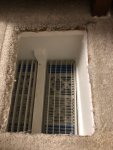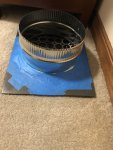....)
3rd, hole in floor near woodstove is a really,really BAD idea...voids most home insurances and against most building codes.….
I don’t know of any homeowners insurance which stipulates the home MUST meet any building code. The underwriter accepts the application for insurance or rejects it based upon all kinds of appraisals …but I’ve not seen any that specify ”building codes”. My own home was built in the country in the middle of 1500 acres in 1950. It had two-wire electrical, FIVE window unit ACs, and THREE 40-gallon electric water heaters, 5 bedrooms, 4 baths with electric heaters….all on a ONE HUNDRED AMP SERVICE ENTRANCE! One of the THREE breaker boxes was a Federal-Pacific which was condemned by the Nat’l Codes before 1960 because the “UL LISTED” was counterfeit.
I “upgraded” the electricals myself. I am not a licensed electrician. I”ve converted to 200A service entrance and installed an outbuilding piggy-backed off the house. The plumbing is a mix of galvanized iron and PVC and PEX.
State Farm paid out for water damage when the roof blew off in a storm…and the contractor insisted on upgrading the electrical to NEC (codes) while they were in the attic making repairs…and State Farm refused to pay for it, refused to require it, and has cont’d insuring the house ever since.
Soo…. I’d certainly like to see where not following codes “voids most home insurances” and where a rural home must meet codes.
In my profession I have heard for decades how the “FAA will violate you” if such-and-such… and how “insurance will void” if such-and-such…. and how a “law suit will bury you”… when such-and-such is found….
The FAA won’t do a thing unless 1)-they witness it, 2)- it results in an accident, 3)-someone is seriously hurt or killed. Aviation Insurance will almost Always “cover” the loss as-agreed because they don’t want the bad press of failing to serve the insured. They may not re-insure …but they will cover the loss.
I’m not opposed to thinking that putting/keeping a house in compliance with codes are the BEST thing to do…but I don’t subscribe to anecdotal suggestions about what insurers and lawyers will or will not do without some evidence.
I agree. Floor duct like that is a no no.
If you had the house inspected prior to purchase I'd call the inspector and get some money back.
I’ve got two rental properties I had inspected prior to purchase. Both of them were later discovered to not meet codes (one didn’t have shatter-proof glass at floor-level next to an entrance-door….a child hazard…. The other had a fireplace which did not meet fire-codes, and had bed-room windows too high on the wall to qualify for fire-exits.)
When I contacted the inspectors who had participated in the pre-buy… BOTH pointed to exclusion-phraseology in the inspection-contract that protected them from liability.
Good luck “getting money back”.
Both of these responses might be taken as “argumentive”….but that’s not what I mean by them. What I hope to convey is that some popularly-held assumptions are simply not true and correct.
The property owner is the Final Responsibility for safety and quality-assurance. Do your due diligence.





